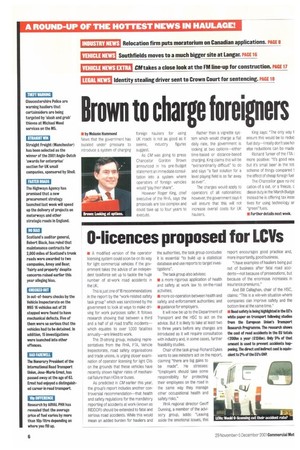0-licences proposed for LCVs
Page 6

If you've noticed an error in this article please click here to report it so we can fix it.
• A modified version of the operator licensing system could soon be on its way for light commercial vehicles if the government takes the advice of an independent taskforce set up to tackle the huge number of at-work road accidents in the UK.
This is just one of 18 recommendations in the report by the "work-related safety task group which was sanctioned by the government to look at ways to make driving for work purposes safer. It follows research showing that between a third and a half of all road traffic incidents— which equates to over 1,000 fatalities annually—are linked to work.
The 31-strong group, including representatives from the RHA, FTA, Vehicle Inspectorate, road safety organisations and trade unions, is urging closer examination of operator licensing for light CVs on the grounds that these vehicles have recently shown higher rates of mechanical failure than HGVs or buses.
As predicted in CM earlier this year, the group's report includes another controversial recommendation—that health and safety regulations for the mandatory reporting of accidents at work (known as RIDDOR) should be extended to fatal and serious road accidents. While this would mean an added burden for hauliers and
the authorities, the task group concludes it is essential "to build up a statistical database and use reports to target investigations".
The task group also advises: • a more rigorous application of health and safety at work law to on-the-road activities; • more co-operation between health and safety and enforcement authorities; and • guidance for employers.
It will now be up to the Department of Transport and the HSO to act on the advice. But it is likely to take at least two to three years before any changes are introduced as it will require consultation with industry and, in some cases, further feasibility studies.
Chair of the task group Richard Dykes wants to see ministers act on the report, claiming "there are big gains to be made". He stresses: "Employers should take some responsibility for protecting their employees on the road in the same way they manage other occupational health and safety risks."
RHA regional director Geoff Dunning, a member of the advisory group, adds: "Leaving aside the emotional issues, this report encourages good practice and, more importantly, good business.
"I have examples of hauliers being put out of business after fatal road accidents—not because of prosecutions, but because of the enormous increases in insurance premiums."
And Bill Callaghan. chair of the HSC, claims: "This is a win-win situation where companies can improve safety and the bottom line at the same time."
• Road safety Is being highlighted in the EC's white paper on transport following studies from the European Union's Transport Research Programme. The research shows the cost of road accidents in the EU totals €200bn a year (£124bn). Only 5% of that amount is used to prevent accidents happening. The direct and indirect cost is equivalent te 2% of the Ell's GNP.
































































































































































